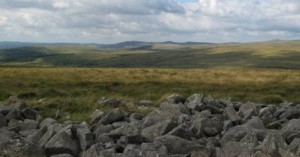Support us from £3/month
We deal with almost 1000 cases a year assisting communities, groups and individuals in protecting their local spaces and paths in all parts of England and Wales. Can you help us by joining as a member?
The Dartmoor National Park Authority will decide the future of military training at Cramber Tor, south-west Dartmoor, at its meeting on Friday (1 February).
The military wants to continue using 848 hectares at Cramber Tor for ‘dry’ training, on a permanent basis. This training involves battlefield simulation exercises that include the use of pyrotechnics, blank ammunition, digging and wiring activities and low flying helicopters, as well as the milder adventure, fitness and navigation training exercises.
Dry training has been conducted at Cramber Tor since the 1980s under a succession of agreements with the national park authority, most recently renewed in January 2003. Now, because of a change in the law which removes crown immunity for planning, the military is for the first time seeking formal planning permission. This is opposed by the society, the Dartmoor Preservation Association and Ramblers among others.
The objectors point out that this open-ended permission could lead to potential damage to the lovely Cramber Tor area with its unique heritage of ancient monuments. Although there are currently few impacts resulting from training activities at Cramber Tor, this is because training levels in the past 10 years have been low. There is a threat that activity levels could be significantly increased and proposals from the national park authority would allow large-scale battlefield simulation exercises to take place with up to 700 personnel involved.
James Paxman, chief executive of the Dartmoor Preservation Association, commented: ‘While we have no objection to adventure training, we are deeply concerned at the possibility of battle simulation, which would destroy the peace of this tranquil area and frighten walkers and riders. The national park authority can only be sure of maintaining the current low-impact training if it imposes new conditions to govern troop levels, aircraft movements and the use of pyrotechnics. Otherwise there is a serious risk that it can be escalated out of control in future.’
He continued ‘It is particularly disturbing that the park authority is proposing an unlimited permission. If this happens the authority will lose all opportunity to influence military activities on this part of the moor, to the detriment of its natural beauty and our quiet enjoyment of this magnificent space.’
Postscript: on 1 February the Dartmoor National Park Authority decided to grant a ‘temporary’ permission, for a further 40 years, with a number of conditions which will probably not prevent the military from increasing its use should it wish to do so. More information is here. While this is obviously better than a permanent permission, it is still a very long time.

